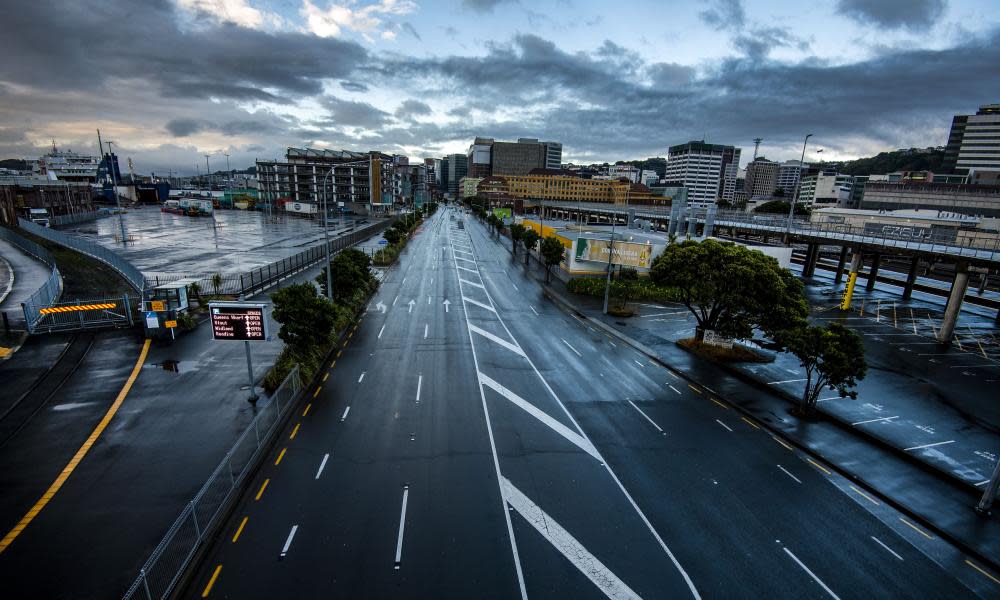New Zealand coronavirus deaths during lockdown could be just 20, modelling suggests

Jacinda Ardern has implored New Zealanders to “stay local” during a four-week countrywide lockdown as modelling showed that strict measures adopted by the country could limit deaths to 0.0004% of the population – or about 20 people.
Research released by Te Pūnaha Matatini suggested that, left unchecked, the virus could eventually infect 89% of New Zealand’s population and kill up to 80,000 people in a worst-case scenario.
According to the research, intensive care beds would reach capacity within two months and the number of patients needing intensive care would exceed 10 times capacity by the time the virus peaked.
Related: Ardern thanks nation as New Zealand adjusts to 'new normal' of Covid-19 lockdown
However, with the strictest suppression measures, which the country has adopted, the fatalities would drop to just 0.0004%. Hospital capacity would not be exceeded for over a year. These measures included physical distancing, case isolation, household quarantine, and closing schools and universities and would require the restrictions to remain in place until a vaccine or other treatment was developed.
However, researchers noted such strategies can “delay but not prevent the epidemic”.
“When controls are lifted after 400 days, an outbreak occurs with a similar peak size as for an uncontrolled epidemic,” the researchers wrote.
The government has currently mandated a four-week lockdown.
In a briefing on Friday in Wellington, Ardern told the nation she did not want to see “the scenes of Bondi Beach in New Zealand”, where many kept going out despite the risk of contracting the virus. On Friday the country saw a record increase of 85 cases in one day.
She told reporters that, despite the lockdown, the number of those infected with Covid-19 would continue to rise for some time.
New Zealand is in day two of a four-week lockdown where non-essential businesses have been forced to close and families to stay home.
“Don’t take road trips. Don’t go outside of your area. Don’t congregate,” Ardern said. “There is an expectation that people will stay in their homes.”
Ardern said that those who were infected would not know for several days. If they broke their local “bubble” they would put many others, including the elderly, at risk.
“Sadly, an increase in cases is expected. In fact, that is the whole reason why we are in a lockdown.”
The prime minister sought to reassure New Zealanders that medical professionals had access to enough protective gear to manage demand across the country.
Ardern said the border, which is closed to visitors, presented the greatest risk in managing Covid-19 and would be managed accordingly.
Finance minister Grant Robertson also clarified that employers were required to pay employees a government wage subsidy, even if they cannot continue to employ them. This would take the support scheme to an estimated NZ$8-12bn.
Earlier, director-general of health Ashley Bloomfield said New Zealand’s total number of patients with Covid-19 stood at 368.
There were 76 confirmed cases and nine probable cases with eight people in hospitals across the country.
Six of these patients were stable, and two are in intensive care units in Nelson and Wellington.
A total of 37 individuals had now recovered.
Bloomfield said that retired medical staff had also come forward to help in the effort, with more than 2,500 coming back into the workforce so far.
Civil defence controller Sarah Stuart-Black said most New Zealanders had been obeying the rules around the country’s lockdown.
There were isolated incidents of people congregating those people were spoken to and advised about what the restrictions mean.
“We have a critical window to save lives and secure New Zealand’s future,” she said. “We understand this places strain on you and your families. The sacrifices you make will save lives.”
Stuart-Black discouraged swimming or surfing where they might get in trouble and have to be rescued. “It’s a matter of judgment,” she said.


